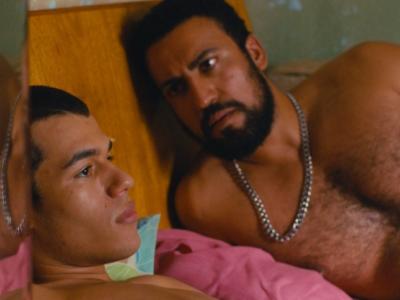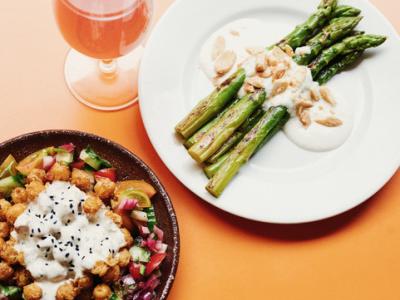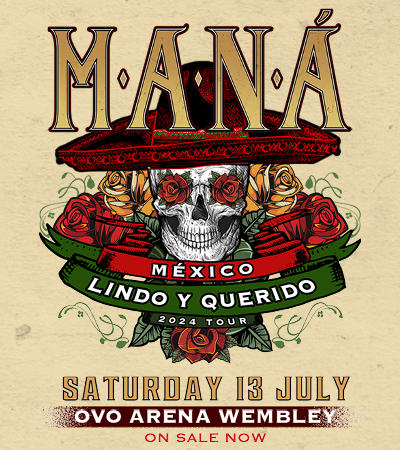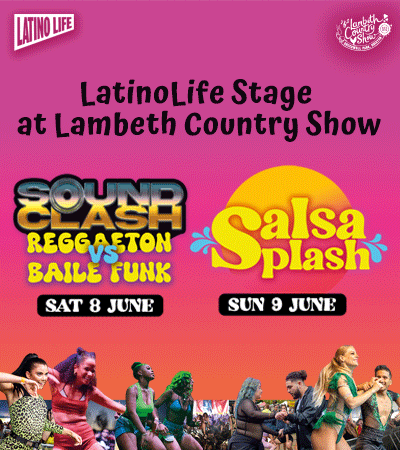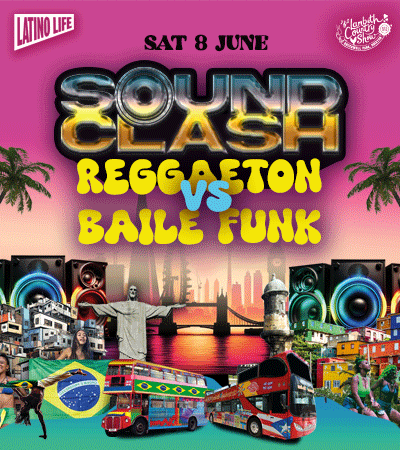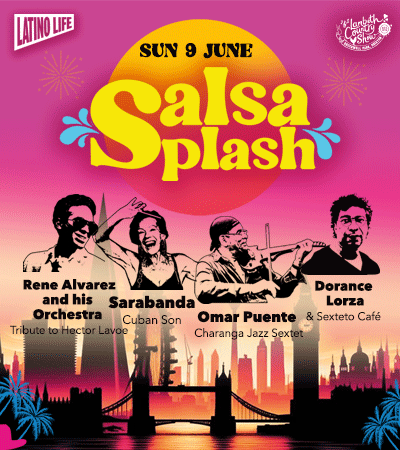By Amaranta Wright
You can’t get much bigger than Juanes. He is simply, according to critics, the leading all-Spanish language music artist in the world, with a record-breaking eighteen Grammies, Latin and non-Latin. He has a string of ridiculously flattering accolades from the US Press. “The single most important figure of the past decade in Latin music,” according to Los Angeles Times. “One of The World’s biggest Rock Stars” says Rolling Stone. “One of the 100 Most Influential People in the World” – TIME.
I mean… what more can you say about the man?
Perhaps you could say, that nobody knows him in the UK, owing to the fact that he won’t sing in English (and he speaks perfect English). But even that isn’t quite true; Shepherd’s Bush Empire will no doubt be bursting at the seams, as it was four years ago, when he plays there in November. More accurate is that English people who only listen to music in English don’t know who he is. But if, despite that, you can be, “one of the most influential people in the world” then let’s face it, who cares?
Before his rise to mega fame, the young heavy metal-influenced Juan Esteban Aristizábal Vásquez, who grew up in Medellin in the Escobar era, founded Ekhymosis, Colombia’s leading hard-rock band of the 90s. After moving to Los Angeles, he was signed by multiple Grammy and Oscar winning producer Gustavo Santaolalla, and released Juanes’ solo debut album Fíjate Bien in 2000. The album garnered a record-setting seven Latin Grammy nominations (winning three).
His second album Un Día Normal bettered this by becoming the best selling and most played Spanish-language album of 2003, and still holds the record for the longest Top-10 chart run (92 Weeks) of any Latin album in history. Unsurprisingly Un Día Normal swept the 2003 Latin Grammy telecast, winning all five awards for which he was nominated: “Album Of The Year”, “Record of the Year”, “Song of the Year”, “Best Rock Solo Album” and “Best Rock Song.”
Since then Juanes has never looked back, and yet, now a global superstar, there is something about Juanes, that is very disarming, forgiving you for thinking that he is still the typical Medellin metalero that he started out as. Typical? Don’t they just listen to vallenato and cumbia in Colombia I hear you say? Actually no, Medellin happens to be like the Latin American epicentre of heavy rock. Why? This is what I wanted to ask Juanes about…
LL: Let’s talk about your heavy metal past. When I went to Medellin I was really surprised by how many young people there loved heavy metal, I think more than in any other Latin American city I’ve been in. How do you explain the attraction of heavy metal to los paisas? What about it attracted YOU?
J: Well, I grew up in a really difficult period in Medellin. I was fourteen and the place was pretty much being run by the mafia, by the drugs cartel, and there were a lot of killings and clashes with the police. It was a time when everybody lived in fear. And heavy metal for me and a lot of young people was really a way to escape, to let out our anger, our frustrations and our fears.
LL: A lot for the metaleros I spoke to identified themselves against the Vallenateros, people who liked vallenato music, because they associated Vallenato with the music of drug lords. Did you feel the same way about vallenato?
J: No I never identified myself against vallenato or the people who liked it, vallenato is our folklore. I grew up with that music and I’m very fond of it. My musical experiences started with that music. My father sang and my brothers played, so I see it as part of our culture so my love of rock wasn’t a reaction against that. On the contrary it is one of the many infleunces on my music.
LL: Do you still listen to heavy metal. How has your musical taste progressed?
J: I still love rock, even though I love all music that is (bien hecha) done well. Obviously my taste has expanded as I’ve grown. For example I love groups like Edward Sharpe and the Magnetic Zeros but also I still love Black Sabbath so yeh, I’m still a big rock fan.
LL: Do you feel more comfortable as a rockero or as a pop star?
J: (laughs) Well I feel most comfortable as a musician. Of course there are pop elements to my music, but there are a mix of many influences in there, from my story. In the end, I feel comfortable being my own artist,
LL: What are the Latin American musicians you most admire?
J: All the great rock groups that our continent has produced; Soda Stereo from Argentina, Café Tacuba from Mexico, Sepultura from Brazil. And then there are the all time great, artists like Caetano Veloso and Gilberto Gil…
LL: Yeh Gilberto Gil I met recently in London, and he had the most incredible aura, so open, so youthful, retaining a kind of childlike innocence even at 70. And his voice was amazing, so well preserved…
J: Yeh I know the guy is amazing. In fact if there is probably one person I’d like to be like at that age it would be him
LL: And what about British artists, Do you like anyone from here?
J: Well of course I grew up in love with the Beatles, Led Zepellin, now I like groups like Arctic Monkeys
LL: If there was one act you’d invite on stage with you at your concert here who would it be?
J: Ha,ha,ha…probably Jessie J! she’s got a great voice.
Mmmm a curious twinning. Talk about worlds apart. But then again if Shakira and Dizzee Rascal can do it, why not? And of course Juanes is all about bringing incongruents together. Back in 2009, he caused huge controversy when he played a concert in Cuba, the second in his Peace Without Bordersseries whose aim is to “promote unity between peoples and the dismantling of borders” (the first was on the Venezuelan-Colombian borders at the height of diplomatic tensions). The concert in Havana's legendary Plaza de la Revolución gathered one and a half million people, as hundreds of buses ferried young and old all corners of the island to Havana, generating the biggest audience by an outsider since Pope John Paul II's 1998 tour.
Juanes’ words at the concert generated rage amongst many of his would be fans in the US "We came to Cuba for love. We have overcome fear to be with you and we hope that you too can overcome it," Juanes said. "All the young people in the region, from Miami in the United States and in all the cities ... should understand the importance of turning hate into love." In the eyes of his detractors, Juanes was at best naïve, at worst a Communist propagandist. But coming from a country where hundreds of trades unionists and community leaders are killed because they are left-wing (which makes them guerrilla sympathizers in the eyes of paramilitaries) and people kidnapped because they are rich, you can see why he would want to promote a message of simple tolerance.
It is true that Juanes has said some contradictory things (his one time support of President Alvaro Uribe must have confused those who thought he was pro-Cuba or a leftie), but his foundation work in Colombia which seeks to educate for non-violent conflict resolution, perhaps speaks more clearly than his words.
LL: So about your activism, I begin (I can hear his breath held) I know you’ve always tried to support human rights without getting involved in politics, which is very difficult to do these days. What have you learnt, say from your experiences organizing the peace concert in Cuba
J: Cuba was an experience of big contrasts. I received a lot of love, from the Cuban people but also I learnt about the importance of love, amidst all the controversies, as the only way to conquer hate. What I did provoked a lot of hate, rage and I experienced a lot of soberbia (a mixture of ideological pride, arogance and bigotry). It made me really sad that people had to be so divided and couldn’t surpass their hatred because it shouldn’t be like this.
LL: Did it make you more cynical or dampen your optimism?
J: No, I still feel optimistic about the world and still continue in my work with Fundacion Mi Sangre, which is about building the tools for peace and reconciliation in the new generation and helping them build a better future through education and psychological treatment for those that have been damaged by war in Colombia.
LL: How would you define yourself politically?
J: I don’t think of myself as political. I mean I don’t even want to use that word, it is so dirty to me. The political system, I think every political system is corrupt in the world. Politicians are terrible, the system they operate in is viscious. But you have to try and change things.
LL: But that in itself is a political statement, because you can think its terrible and do nothing or you can try and change it and that’s political, because you are challenging the system.
J: I think the way forward is popular action via the social networks, because democracy isn’t working. Free information is vital for change and that is really only available on the internet and the social networks is the means to mobilize. I mean what they did in Tunisia, Egypt and the Middle East is really inspiring. That is the way to make change happen.
LL: And which political individual do you admire?
J: Bob Marley
LL: And what about Colombia? It's had its ups and downs you could say. The latest thing in the international news is the phenomenon of the narco-novelas, the soap operas about the big narco traffickers of the 80s and 90s that are so popular. What do you think of the phenomenon?
J: I find it sad. I mean, I have contradictory feelings and there is a contradiction there. On the one hand its necessary to know about out history and the narco. But there is a sense of idolizing those figures also, by giving them such importance. Young people in Colombia need other role models, and an inspiration other than the example of easy money. I mean that is not who we are or the image we want to project. I mean Colombians are super hardworking. Everywhere they go in the world we graft and graft, that is our reality and is nothing like the image that the world has through they glamorized narco stories
LL: Talking of community, you know we have a massive Colombian community here in the UK, and we have our own awards, the LUKAS Awards, recognizing their achievements. What messagewould you like to send the community in general and in particular the nominees in the Awards?
J: I think its great you've started these awards. Latinos have managed to spread their culture into the meanstream wherever they go, always working hard, despite the obstacles, and Europe is no exception. It’s great to see how Latinos keep the connections with their roots and the love for their culture and its super important to have an Awards that recognizes this. This should be celebrated and the talent and effort that has achieved this should be rewarded. So yeah I’d like to wish everyone good luck who enters those awards. I’m sure they going to grow into something really big.






